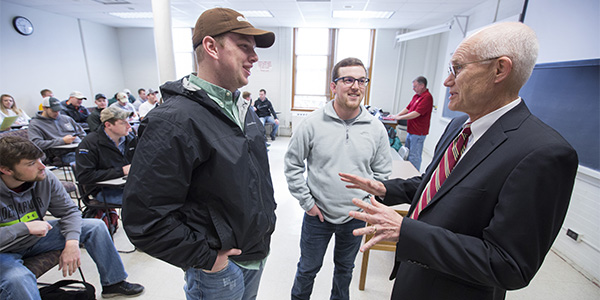
Pursuing Questions
Before Alan Barkema became senior vice president for the Federal Reserve Bank of Kansas City, he used to hang out at the coffee station on the third floor of Heady Hall.
Technically, it was in the hallway connecting East Hall and Heady Hall—where economics and sociology meet—where graduate students like Barkema would gather to discuss research, to support each other and tackle tough questions.
The coffee was average, but the conversation above par.
Barkema (’73 farm operations, ’85 MS economics, ’86 PhD) has always been driven by curiosity. He returned to his family farm near Alexander, Iowa, after earning his master’s degree at Cornell University, but his desire to learn brought him back to campus and to Heady Hall. That’s where Earl Heady, distinguished professor, former chair and building’s namesake, encouraged him to get serious about his studies and consider a career in academia.
“Iowa State is a great place to pursue questions,” Barkema says. “When the 1980s farm bust came I was working with Bob Jolly and William Edwards in extension. I was fascinated with what happened to farmland values. I was a number cruncher on the farm financial stress task force for the dean of the College of Agriculture. It was an extraordinary experience during those tough times.”
Jolly served as Barkema’s major professor. The emeritus professor of economics says Barkema’s broad knowledge of economics and agriculture sets him apart from most agricultural economists.
“There aren’t many folks who can bring together macroeconomics and production ag like Alan. His career-long interest in how macroeconomics, things like money supply, employment, inflation, interest rates and so forth, have influenced the ag sector are a hallmark of his,” says Jolly. “On top of that, he has well-honed skills that make economics—the dismal science as some have termed it—cogent and understandable. He explains some pretty challenging things in a very nonthreatening way.”
Barkema credits former career services director Roger Bruene for first helping him find his way at Iowa State and introducing him to another main mentor—agronomy professor Ken Frey.
“I worked for Dr. Frey the summer before my senior year as an apprentice to see how science worked and get acquainted with field work and plant breeding,” Barkema says. “Dr. Frey was a world famous scientist.”
Barkema earned a master’s degree in plant genetics from Cornell University in 1978 and graduated from the executive program at Stanford University in 2009.
“The Stanford program broadly considered what affects an organization’s performance, a big help to me in my role at the Kansas City Fed. Culture and teamwork are fundamental, and I encourage students to build their team skills during their ISU years.”
He landed at the Kansas City Federal Reserve Bank in 1986.
“They were looking for someone who knew something about agriculture and monetary policy. I thought I’d go for a few years and get experience. That turned into 25 years, and I’ve been thrilled with the experience,” Barkema says. “Initially agriculture was my beat. Kansas City has always maintained the Federal Reserve’s agricultural brain trust, and that is still true today.”
Barkema joined the faculty at Oklahoma State University and served as chair of the Department of Agricultural Economics for three years.
“That was a good time for me to take a break from the Federal Reserve and gain some new leadership experience in an extraordinary educational and research setting,” Barkema says.
He returned to the Federal Reserve, where he worked with fellow Iowa Stater Tom Hoenig who was president of the Federal Reserve Bank of Kansas City from 1991 to 2011. Barkema retired in 2012 as the senior vice president and director of research.
“I served through the financial bust of the late 2000s. It was a difficult period for the nation, and an extraordinary challenge. I learned so much and worked with such wonderful and amazingly talented people. It allowed me to see the economy and agriculture from a whole new level and light.”
Barkema shared his experiences and expertise at Iowa State University in April as he presented the 2017 Carl and Marjory Hertz Lecture in Emerging Issues in Agriculture.
He offered his thoughts on current trends and issues impacting agricultural economics nationally and globally. Barkema says that while some connect today’s economic climate to the farm boom and bust of the 1970s and 1980s, there are important differences between then and now.
“A calamitous drop like that of the 1980s is unlikely, because the economic environment is much different today. Inflation is at a modest level, and the economy is on a slow growth path. This calls for measured and deliberate action, not what we had in the ’80s,” Barkema said during the lecture. “Looking ahead, agriculture will face tough challenges, but global food demand will grow.”
Barkema encouraged students to ask tough questions, and bring issues into focus in a way that leads to logical conclusions.
Following Barkema’s presentation, Kayleigh Koch, a sophomore in agricultural business raised her hand.
“When you were a student you said a question you pursued was, ‘how do we feed a growing population?’ What do you believe is another major issue in agriculture students like myself should be working to solve,” Koch asked.
“I grew up in the era when trying to feed a growing global population was front and center. And, there is still much to be done there. But, the questions that swirl in my mind are how to feed the world in a sustainable way and in a way that makes good business sense. I think those are the two major questions,” Barkema replied. “But, I’m sure you’ll have better questions as you move forward.”



